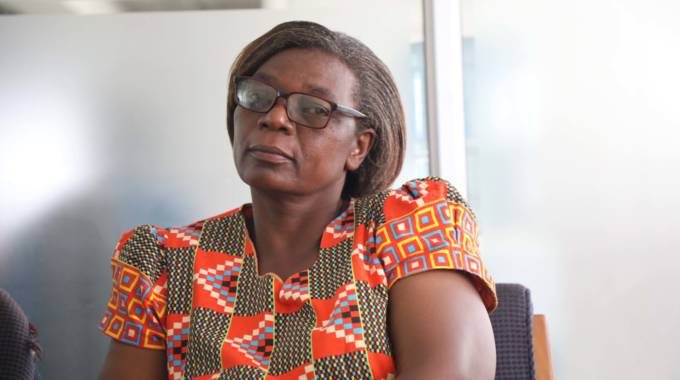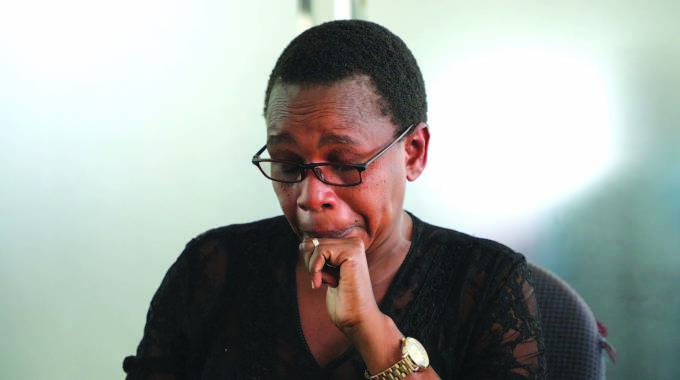
The Sunday Mail

Veronica Gwaze
THREE women, Netsai Shumbanhete, Naomi Chimbganda and Revai Ndaza share three things in common.
They are all mothers.
Furthermore, the three are teachers.
Another interesting thing is they were all widowed the same year.
Today, the trio would be expecting a Mother’s Day treat from their beloved husbands, family and children.
Yet, sadly that is not the case as fate had other ideas and snatched their husbands at a time their children needed both parents the most. The three find themselves on the list of several Zimbabwean women that have lost loved ones to the Covid-19 since its onset in 2020.
Chimbganda’s husband died in January 2021 while Revai Ndaza and Netsai Shumbanhete were visited by the Grim Reaper on July 18 and July 19 respectively.

Revai Ndaza
The deaths, experiences and events that ensued were almost similar in nature.
That is not all!
They are all friends, perhaps now solidly bonded by misfortune.
Shumbanhete and Naomi Chimbganda already knew each other before the untimely loss of their spouses. As fate had it, Ndaza came into the mix after she met Shumbanhete at a local funeral palour during funeral arrangements.
In public, the women present brave faces yet deep down they are emotionally wrecked and still to recover from the heavy blow life has dealt them.
In fact, events like Mother’s Day seem to open their wounds, especially considering that this is the first time Ndaza and Shumbanhete are recognising the day as widows.
“Life was sweet. In all these years David (Shumbanhete) never hit or made me feel that I was old. We went to the shops together and most people knew us and that we were inseparable,” reminisced Shumbanhete as she attempted to conceal her grief with a smile.
Mother’s Day celebrates motherhood and women’s contributions to the family and society in general.
“He was so caring and would go out of his way to make sure that I’m comfortable,” the mother of four added.
Shumbanhete was married to her husband for 32 years.
The two met in Chiredzi in 1990 when she was still a part-time teacher at Chiredzi Secondary School while David was employed by a top bank.
Tragedy
Last year in June the couple, now staying in Harare, came down with flu. Assuming that it was an ordinary bug, they resorted to home remedies.
Within a few days, Shumbanhete recovered but David’s condition deteriorated, prompting them to seek professional medical attention.
On July 1, David was tested for Covid-19 and the results came out negative.
But the tests were repeated the following day and the result was positive this time around. Unfortunately, his condition further deteriorated leading to his untimely demise.
“I failed to see him for the 17 days that he was unwell and admitted in hospital and that has affected me up to now. If I had the chance to meet him on any one of the days I visited, I could have prepared for his demise.
“I am still in pain but have to be strong for the kids. I am trying to cover the void he left within the family but it is always going to be a mammoth task. I cry most of the time but I cannot do it in front of kids,” she said holding back tears.
It is now close to a year since Shumbanhete lost her husband but she still wears black clothes, symbolising her grief.

Netsai Shumbanhete
Recovery, she reckons, is going to be a challenge for her.
“Life is no longer the same and meaningless,” lamented Shumbanhete.
“My world crumbled when he passed on. The situation was made worse because I had lost my mother-in-law in 2019 and my mother in August of the following year.”
Ndaza is equally troubled.
She got married to Gilbert (Ndaza) in 1990 and were both teachers and pastors, blessed with three children.
“Life has not been the same without him. I miss him, especially during times like these. We did everything together and up to now I still avoid certain places we frequented together, like church, because I end up getting emotionally overwhelmed,” revealed Ndaza.
As a mother, she feels it is her responsibility to make sure that the family is catered for.
While she misses her husband, she added, this was not going to distract her from being a mother and ‘father’ figure in her children’s lives.
“I cannot be a father in their (children) lives but I will make sure that I cover the void as much as possible. However, I don’t know who is going to help me heal as I miss my husband more with each passing day,” said Ndaza.
Trauma
Chimbganda said she was feeling lonely and needed closure because of the traumatic situation she was exposed to following the death of her husband, Raphel.
“This will be my second Mother’s Day without him. To be honest, it now feels like an ordinary day for me. I don’t even remember how I spent it last year as I was still confused and mourning,” narrated Chimbganda.
She recounts the horror that the family and herself went through.
“During those days, funeral parlours were overwhelmed and we were not spared. He died at home and we called them for the removal of his body around 10am but they only came at midnight. Imagine the trauma that we went through the whole day?” she recalled.
“I watched as the parlour attendants zipped him into an airtight bag as if it was in a movie. When we buried him in Mutoko, stigma was still rife. For closure I often find myself talking to one of his large portraits in our bedroom.”
Chimbganda met her husband during the liberation struggle in Mozambique.
Inspired by their near similar experiences and friendship, the three mothers have since set up a group where Covid-19 widows can converge and find closure.
“The lockdown period was tough and a lot happened.
“Some people, particularly women are still nursing the effects of horror experiences hence we feel there is need for closure,” the mothers argue.
“Other widows should come forward so that we share the stories and console each other. If we could meet the First Lady and other relevant associations that can listen to our stories, we would be grateful.”
Travelling was not possible for many during the lockdown period. Likewise, most funeral rites like body viewing were disregarded in line with Covid-19 prevention regulations. This affected many psychologically.
“Relatives could not come and for the few that came, they had to stare from a distance. The people we thought were close abandoned us at the time,” added Shumbanhete.
Even if their children shower them with presents this Mother’s Day, the women still feel the void left by their husbands.



